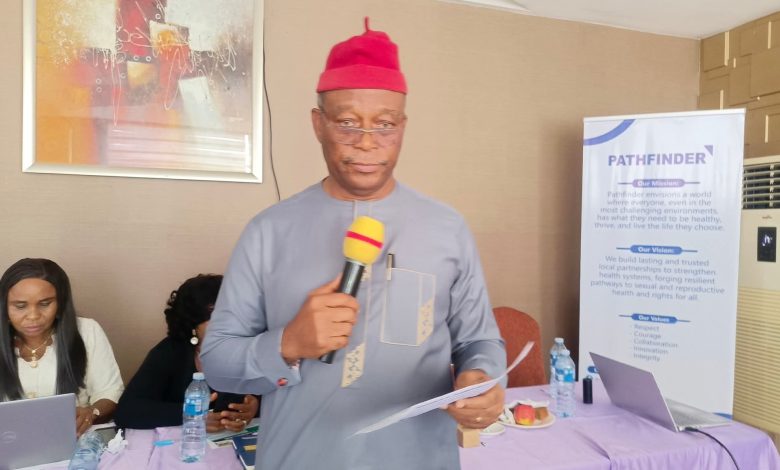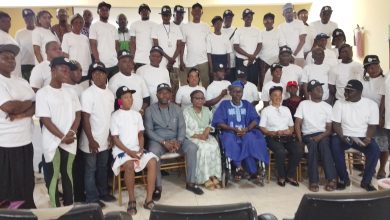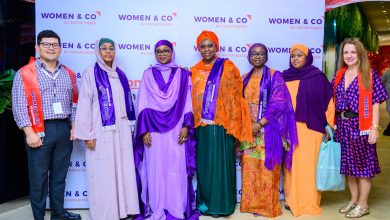Health stakeholders, media practitioners, call on govt to prioritize family planning funding

Photo: Dr. Ejike Oji making a speech at the workshop
By Ifeanyichukwu Eduzor
The alarming rate of high maternal mortality among women in the country which places Nigeria as one of the highest in the world has prompted health stakeholders and media practitioners to make an urgent call to the government to prioritize family planning funding inorder to arrest the ugly situation.
This call to action was made during the just concluded capacity-strengthening workshop held in Abuja for journalists and social media influencers in Nigeria, organized by a non governmental organization, Pathfinder International Nigeria, under the Smart Advocacy for Strategic Action (SASA) project implemented in collaboration with PPDARO and Jhpiego Kenya.
The workshop was aimed at deepening journalists understanding of family planning and maternal, newborn and child health priorities, challenges and opportunities across states
Analysing the impact of maternal mortality rate in the country, the participants noted that with 517 deaths per 100,000 live births in the country according a 2018 report by Nigeria Demographic and Health Survey, there is urgent need for government to do more in arresting the ugly situation.
” There’s need for increased government funding of family planning programmes in the country considering the high maternal mortality rate being witnessed in Nigeria. More alarming is that about 70% of these deaths occur among girls below the age of 18.
“The fact that about 90% of these deaths which are avoidable are caused by unsafe abortion, haemorrhage and premature births are the more reason why government should treat it as a national emergency by ensuring improved health facilities, regular counter funding payment, provision of adequate commodities and improved welfare of health workers”, they argued.
At the workshop, it was observed that report from states used as case study, paint a bleak future as all the states under review namely; Kaduna, Kano, Lagos and the Federal Capital Territory, Abuja cited underfunding, late release of allocated finds, inadequate medical facilities, out of stock syndrome, wrong requisition code, poor remuneration of healthcare workers, illiteracy, poverty, cultural and religious beliefs as factors affecting family planning in their States.
Report from Kano state indicates that
contraceptive prevalence rate in the state has increased from 0.5% in 2003 to 11.0% in 2013 while unmet needs rose from 11.1% in 2013 to 26.0% in 2023.
The report posited that not minding that Kano State has the highest number of maternal mortality rate in the country which stood at 1000 deaths to 100,000 live births, late release of family planning funding is still being witnessed in the state.
However, the report indicate that in a bid to address these challenges, Kano State government launched a strategic plan for Child Birth Spacing (FP) in December 2024, aimed at providing reproductive health services to over 756 health facilities. The state also passed the Free Maternal and Child Health Care Law in May 2023, guaranteeing free prenatal, maternal, and child healthcare services – making it the first state in Nigeria to do so. But despite all these commendable efforts, much remains to be done to significantly reduce maternal mortality.
Kaduna State is not different from Kano as it continues to struggle with poor funding for family planning programmes.
The report indicates that although, the state government budgeted N70 million for this year’s family planning programmes but the fund is yet to be released thereby jeopardizing family planning programme in the state .
It was further reported that while the state government has employed more midwives and skilled health attendants in rural areas, poor renumeration has made Doctors, Nurses and Midwives to look for greener pastures elsewhere.
The report hopes that the recent increase in health workers renumeration announced by the state government would be implemented by the end of this month just as it recommended more engagement with traditional rulers for reduced stigma of religious and cultural challenges facing the programme in Northern Nigeria.
In Abuja, it was discovered that while residents of city centres in the FCT enjoy relatively easy access to such facilities, those in rural communities across the six council areas remain underserved.
Lagos however, seem to be different from.other states under review because apart from it’s huge population put at about 17 2 million according to according to UN World Urbanisation Prospects, the state has recorded giant strides in it’s family planning campaign
Report indicates that the state targets a high Contraceptive Prevalence Rate across its 20 Local Government and 37 Local Council Development Areas.
It was also discovered that Contraceptive use in the state is on the high side with about 59.7 percent of women in a sample use some form of contraceptive; although only 38.5 percent utilise modern methods such as male condoms, implants, and injectables. The state’s total fertility rate is estimated at 3.807, with a maternal mortality ratio of 430 per 100,000 live births.
In order to achieve more success, Lagos State offers free family planning services through public health facilities and special health weeks, supported by partners including the Bill & Melinda Gates Foundation. In line with its slogan, “Childbirth is not a death sentence: Safe childbirth is a fundamental human right,” the government provides free antenatal care and delivery services, including caesarean sections, at all public hospitals.
It’s information access is also commendable, as women in the state, get family planning information through interpersonal channels such as health centres and word-of-mouth, as well as through traditional and social media.
The state also ensures timely budget approvals and releases, and operates a robust health insurance scheme known as Ilere-Eko, which has proven highly beneficial to women.
The Sector-Wide Approach (SWAp) to healthcare in Lagos aligns all stakeholders, including the Lagos State Ministry of Health, Federal Government, and development partners, under a unified strategic plan and framework. This ensures integrated, efficient, and evidence-based healthcare delivery.
aggressive and strategic media engagement and campaigns using various multimedia platforms – traditional and new media – to lead awareness campaigns in their communities.”
But not minding these modest achievements recorded by the state’s family planning drive, funding in certain areas and insufficient resources continue to pose a significant barrier to comprehensive services and logistics, particularly given the state’s growing population.
In his presentation, Dr. Ejike Oji, the Chairman of the management committee of the Association for the Advancement of Family Planning (AAFP) Nigeria, stressed the need for both the Federal and State Governments to take the issue of family planning commodities serious lamenting that at the beginning of this year, out of a total of $4 million approved by government, only N60 million was released.
He however commended the Minister of Health for gradually changing the narratives which led to the Ministry approving $60 million for procurement of family planning commodities through the National Primary Health Agency.
“We must commend the present Minister of Health for taking the bold initiative to approve such an amount which is the first time in Nigeria such a huge amount is allocated to family planning commodities.
“Apart from this, the Presidential Initiative For Value Chain also allocated N5.77 billion for the purchase of FP commodities while in the third trench, the President approved $200 million which was basically to take care of the counterpart funding of USAID for HIV, malaria and tuberculosis programme which was one of the things trending and it would have been very catastrophic for the nation medically because the absence of these drugs means that anti retroviral will become prevalent and more people will be infected
Dr. Oji who also doubles as convener of the five million Women Data Base was also emphatic that buying these commodities through USAID will not only be more beneficial and cost effective for the country but will lead to accountability in the whole process.
“USAID uses what is known as economy of scale of purchase for about 53 countries of the world which enables them to buy commodities at a reduced price for countries and there is need for Nigeria to channel the monies through the organization to enable it benefit from the economic subsidy.
“The way USAID operates is that if you purchase commodities worth $357,000, you’ll get a marching grant of $2 million . So, if the Federal Government contributes $100,000 and all the states were able to contribute the balance of $357,000, the country will still unlock the $2 million grant.
“Through this process, the country will also unlock more financial expenses like quantification exercises because if you don’t have proper quantification, you won’t know how much commodity to buy,” he stressed.
He posited that in view of the huge amount of money the government approved, people should be concerned about the accountability process since nobody is sure whether these commodities would be purchased through USAID or by individuals.
Dr. Oji also challenged the media to intensify FP/MNCH advocacy through agenda-setting, narrative shaping, and accountability-driven journalism.
“The media has a critical role to play,” Dr Oji asserted. “They should mount aggressive and strategic media engagement and campaigns using various multimedia platforms – traditional and new media – to lead awareness campaigns in their communities.”
He further advised media practitioners to engage local primary healthcare leaders and gather grassroots data for well-researched stories that could inform policy shifts towards adequate funding and timely budget releases.
The family planning advocacy expert also called on the media to demand the release of the 2023 data report to facilitate proper funding of FP/MNCH programmes even as he announced that his organisation would launch a Five Million Women Data Base(WDB) on 17 October this year, aimed at bolstering data-driven advocacy and policy formulation.
In his remarks, President of Nigeria Union of Journalists, Comrade Comrade Alhassan Yahaya, commended Pathfinder for putting together the workshop which he believes will widen the horizon of the participant’s knowledge about family planning and Maternal Newborn and Child Health issues.
The NUJ boss while regretting that many states in Northern Nigeria are relegating the issue of family planning or child spacing as they call it in the region to the background, noted that the capacity building workshop will enable journalists to highlight these issues more and become stronger advocates for family planning in all parts of the country.
He charged journalists to dedicate more of their time and write -ups to issues aimed at reducing maternal mortality, reminding them that through family planning or child spacing, maternal mortality rate could be reduced by 40%.
In his welcome address, Pathfinder Senior Media and Communication Officer, Bayo Ewuola, said the workshop became necessary inorder to equip journalists with better information about issues related to family planning and Maternal mortality as well as encourage them to highlight such issues in their various media platforms inorder to attract more government attention.
” We discovered that most times sensitive issues like family planning and maternal new born and child health issues are always relegated to the background and it’s only when such issues are properly highlighted by the media that it will not only get adequate attention from government but make people become more aware of the challenges which prompted this seminar
” Right now, we’re more concerned with solution journalism which will proffer solutions on how some of these issues could be tackled using different media platforms instead of only investigative reporting and we believe that participants in this workshop at the end of the day will be better equipped to appreciate the problems being encountered in family planning and maternal health.
At the end of the workshop, all the participants agreed that there is need to save women and the girl- child from avoidable death and the best way to do this is for the government to declare a state of emergency on maternal mortality in the country





